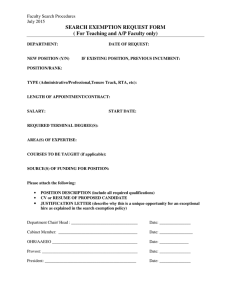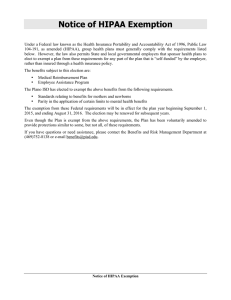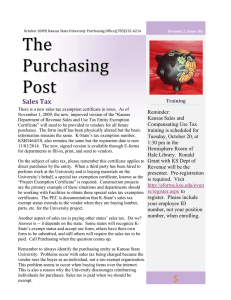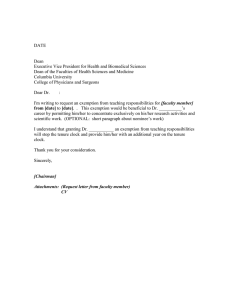Fact Sheet 176 - Minnesota Department of Revenue
advertisement
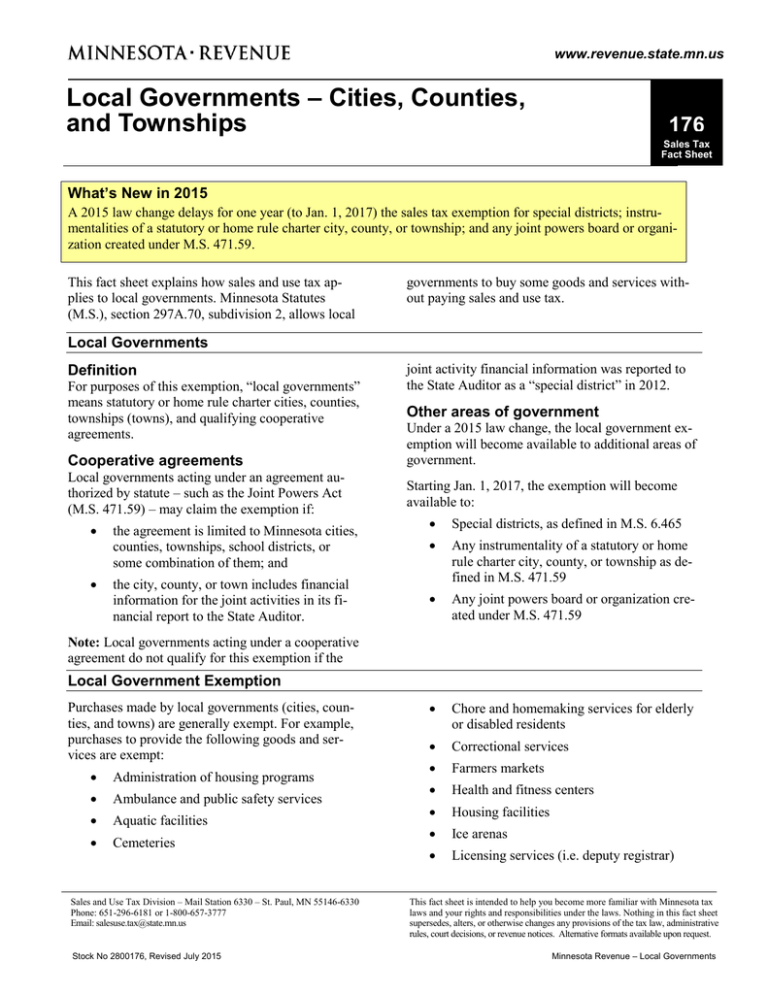
www.revenue.state.mn.us Local Governments – Cities, Counties, and Townships 176 Sales Tax Fact Sheet What’s New in 2015 A 2015 law change delays for one year (to Jan. 1, 2017) the sales tax exemption for special districts; instrumentalities of a statutory or home rule charter city, county, or township; and any joint powers board or organization created under M.S. 471.59. This fact sheet explains how sales and use tax applies to local governments. Minnesota Statutes (M.S.), section 297A.70, subdivision 2, allows local governments to buy some goods and services without paying sales and use tax. Local Governments Definition For purposes of this exemption, “local governments” means statutory or home rule charter cities, counties, townships (towns), and qualifying cooperative agreements. Cooperative agreements Local governments acting under an agreement authorized by statute – such as the Joint Powers Act (M.S. 471.59) – may claim the exemption if: the agreement is limited to Minnesota cities, counties, townships, school districts, or some combination of them; and the city, county, or town includes financial information for the joint activities in its financial report to the State Auditor. joint activity financial information was reported to the State Auditor as a “special district” in 2012. Other areas of government Under a 2015 law change, the local government exemption will become available to additional areas of government. Starting Jan. 1, 2017, the exemption will become available to: Special districts, as defined in M.S. 6.465 Any instrumentality of a statutory or home rule charter city, county, or township as defined in M.S. 471.59 Any joint powers board or organization created under M.S. 471.59 Chore and homemaking services for elderly or disabled residents Correctional services Farmers markets Health and fitness centers Housing facilities Ice arenas Licensing services (i.e. deputy registrar) Note: Local governments acting under a cooperative agreement do not qualify for this exemption if the Local Government Exemption Purchases made by local governments (cities, counties, and towns) are generally exempt. For example, purchases to provide the following goods and services are exempt: Administration of housing programs Ambulance and public safety services Aquatic facilities Cemeteries Sales and Use Tax Division – Mail Station 6330 – St. Paul, MN 55146-6330 Phone: 651-296-6181 or 1-800-657-3777 Email: salesuse.tax@state.mn.us Stock No 2800176, Revised July 2015 This fact sheet is intended to help you become more familiar with Minnesota tax laws and your rights and responsibilities under the laws. Nothing in this fact sheet supersedes, alters, or otherwise changes any provisions of the tax law, administrative rules, court decisions, or revenue notices. Alternative formats available upon request. Minnesota Revenue – Local Governments Local festivals and fairs Public use/Municipal airports Cleaning and maintenance of buildings Public transit Lawn care and tree removal services Recreational and athletic facilities Road and street maintenance and lighting Construction equipment that is not licensed for road use Sewer and water services Most firefighting, police, and emergency equipment – including repair parts, accessories, protective gear, fuel, foam, water, etc. – except motor vehicles (see page 3) Office supplies, computers, software, printers, furniture, etc. Other vehicles that are not licensed for road use, such as aircraft, snowmobiles, and watercraft Road-building materials and the delivery of aggregate materials Utilities, chemicals, and fuels Examples of exempt inputs include: Wastewater treatment services To purchase inputs used to provide these services exempt from tax, the local government must provide the seller with a completed Form ST3, Certificate of Exemption, at the time of purchase. Note: This exemption applies only to the purchase of inputs made by local governments in providing their goods and services. It does not apply to sales made by local governments. The exemption was first effective Oct. 1, 2011 and was limited to certain services provided by towns. The limited exemption became effective for cities and counties in 2014. The exemption expanded starting Jan. 1, 2015 to include all services except for those in the next section. Purchases that do not qualify for the exemption Purchases to provide the following goods and services are taxable and do not qualify for the local government exemption: Purchases to provide the following goods and services also remain taxable: Construction materials and supplies purchased by a contractor or subcontractor under a lump-sum contract (see page below) Purchases of construction materials for buildings or facilities which are not principally used by the local government Gas and electric utilities Liquor stores Golf courses Solid waste hauling Solid waste recycling (certain equipment used at a “resource recovery facility” may be exempt) Purchases of lodging, prepared food, candy, soft drinks, and alcoholic beverages Landfills (see page 3) Leases of motor vehicles Marinas Purchases of motor vehicles (see page 3) Campgrounds Purchases subject to other taxes, such as solid waste management tax or petroleum tax Cafes Laundromats Purchases made by an employee that are reimbursed by the local government Note: Local governments do not pay local sales or use tax. Local governments including cities, towns, counties, instrumentalities, political subdivisions, commissions, special districts and governmental boards are not required to pay general local sales taxes. However, state sales tax and special local taxes generally apply. Minnesota Revenue – Local Governments 2 Additional information Construction contracts Local governments are exempt from sales tax on purchases of construction materials for their own use. However, this exemption does not apply to material purchases when the local government hires a contractor under a lump-sum contract that includes both labor and materials. Contractors must pay sales or use tax on the cost of all materials, supplies, and equipment to complete the construction contract unless authorized to act as the local government’s purchasing agent. For more information, see: Fact Sheet 128, Contractors; and Revenue Notice 95-05, Construction Contracts – Purchasing Agent Exemption. Emergency rescue vehicles, including fire trucks, pumper trucks, hook and ladder trucks, clearly marked trailers that do not have to be registered for use on public roads. Marked police patrol vehicles and ambulances that do not require registration for use on public roads. Certain road maintenance vehicles for towns (only). This includes snowplows, dump trucks, street sweepers and others used exclusively for road maintenance – except for automobiles, vans, or pickup trucks. Publicly or privately operated transit vehicles, such as city or town buses, and vehicles used to provide special transportation services for elderly or disabled residents. To qualify, the transit operator must: Correctional facilities Local governments may be eligible for a refund of sales tax paid on construction materials and supplies used to build or improve an adult or juvenile correctional facility. To qualify, the project must be required by state or federal law, rule, or regulation. If a contractor or builder buys materials, they must give the local government a statement that lists the cost of the materials and the sales tax paid. o receive financial assistance or reimbursement under M.S. 174.24 or 473.374; or operate under M.S. 174.29, 473.388, or 473.405. Vehicles for public or private ambulance services licensed under M.S. 144E.10, including: o To request a refund of sales tax paid, use Form ST11, Sales and Use Tax Refund Request and Multiple Period Amended Return. o o Meals or drinks are exempt when they are furnished, prepared, or served to inmates or residents at correctional, detention, or detoxification facilities. Motor vehicles used as ambulances Motor vehicles equipped and specifically intended for emergency response o Supplies and equipment used to provide medical care Hospitals and nursing homes o Repair and replacement parts for ambulances or other emergency response vehicles (as described above) Hospitals and nursing homes owned and operated by a local government are exempt. This exemption includes purchases of meals and snacks provided to patients at hospitals, sanitariums, nursing homes, or senior citizen homes as part of their routine care and included in the facility’s charge. For more information, see Fact Sheet 118, Hospital and Nursing Home Meals. Motor vehicles Generally, local governments cannot lease or purchase motor vehicles exempt under this exemption. However, state law provides other limited exemptions for motor vehicle purchased by specific government agencies. These exempt vehicles include: Landfills (solid waste disposal facilities) Local governments are exempt from sales tax on machinery and equipment used directly for mixed municipal solid waste management services at the landfill. This exemption does not include motor vehicles. Multiple-use purchases Some local government purchases may be used to provide both qualifying and non-qualifying goods and services. In these cases, the local government may allocate the purchase total and pay use tax on the taxable portion. Minnesota Revenue – Local Governments 3 You must use a reasonable method of allocation and keep business records that clearly identify how you determined the tax. or public safety; some are used to provide services that do not qualify for the exemption, such as a cityowned liquor store or golf course. Example A city purchases office supplies for all of its agencies. Some of the supplies are used to provide services that qualify for the exemption, such as housing The city may allocate the sale to determine what portion of the purchase is being used for nonqualifying services and is, therefore, taxable. The city then pays use tax on that portion. References Minnesota Statutes 297A.67, subd. 25, Maintenance of cemetery grounds Minnesota Statutes 297A.68, subd. 19, Petroleum products Minnesota Statues 297A.70: subd. 2, Sales to government subd. 3, Sales of certain goods and services to governments Minnesota Statutes 297A.98, Local governments exempt from local sales taxes Minnesota Statutes 297B.03, Exemptions Revenue Notice 95-05, Construction Contracts – Purchasing Agent Exemption Revenue Notice 12-08, Exemption for Towns Other Fact Sheets 121A, Lawn and Garden Maintenance, Tree and Shrub Services 123, Athletic Facilities, Recreational Areas, Resorts, and Campgrounds 128, Contractors 142, Sales to Governments Minnesota Revenue – Local Governments 4
